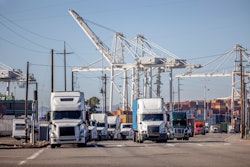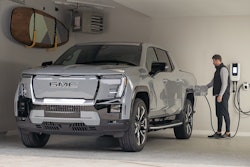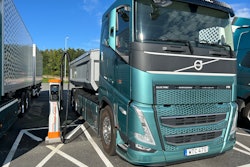David Carson, senior vice president of sales and marketing at Daimler Truck North America (DTNA), stated his support for zero-emissions vehicles, but said that implementing it must be done “at the speed of right.”
“Whatever path you take, it has to make sense for the industry,” said Carson, who was a keynote speaker at the FTR Transportation Conference in Indianapolis this week. Though DTNA has fully developed medium- and heavy-duty battery-electric vehicles, the biggest weakness is charging infrastructure. Carson sees it as the greatest short-term risk that the industry is facing.
While many laws and regulations are good in spirit, implementation and execution are difficult.
From a time standpoint, especially as it relates with Advanced Clean Fleets regulations, Carson said, “Just going full steam ahead on something that might be extremely difficult, if not impossible to execute the way that it is envisioned, creates so much uncertainty in our industry and is really difficult.”
Carson believes that a White House regime change won’t necessarily slow down or eliminate CARB mandates. “Whether or not the time frame makes sense for execution is a different answer,” he said.
Carson said DTNA believes battery electric vehicles have a place in the commercial vehicle industry, but it’s not a one-size fits all solution. While the company has sold a high number of battery electric school buses, Carson said it doesn’t yet see a place for all battery electric in long-haul.
“We’re going to need to use hydrogen," he said. "That’s inclusive of hydrogen fuel cells, possibly nitrogen in the combustion. We’re going to have to explore all of these things, and we believe that some of them probably work better in certain applications.”
As manufacturers prepare in 2025 for an expected surge in demand before the EPA emissions mandates take effect, Carson pointed out lessons from supply chain issues during the COVID-19 pandemic will be valuable. A major lesson from that time is the importance of collaborating more closely with suppliers and providing transparent forecasting.
“They key is really about us signaling less of huge peaks and valleys and trying to have some consistency so they can plan their staffing and plan their capital investments,” said Carson. “So, we spend a lot of time with our supply base trying to help them understand [the market].”
Nearshoring in Mexico, Carson said, has proven beneficial this year, enabling suppliers to bring production closer to North American customers.
With an upcoming election, Carson pointed out the importance of the free trade agreement between United States, Mexico, and Canada. “The free movement of goods and trade is critically important for the commercial vehicle industry, certainly for Daimler. And we pay a lot of attention to make sure that it continues,” he said.
With Chinese truck manufacturers establishing production in Mexico, Carson also noted that it would have significant consequences to the current industry. “Primarily around the fact that even as they enter Mexico, they have no dealer network whatsoever. They sell products, [and] they have no way to service.”












